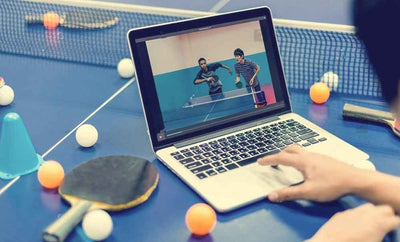
Avoiding Staleness in Table Tennis
Author: Kevin James, ITTF lvl 3 coach, Professional Table Tennis Player
For an elite table tennis player, preparing for a tournament is a delicate process of balancing training, recovery, nutrition and the many other factors that go into ensuring a peak performance. And while us lesser players may not want or be able to go to the extremes that elite players do to get ready for a big event, nevertheless we can still learn a thing or two from the top athletes regarding our own tournament preparation .
One such lesson we can learn from the pros is to spend a little time planning our playing schedule in the lead up to our tournament, to avoid being over-trained and stale on the day of the competition.
This particular lesson is especially vivid in my mind because I have just recovered from a mental burn-out that I suffered before one of our important local competitions. And while I'm not claiming to be anywhere near the standard of the elite players, I think the mistakes I made and the lessons I learned are applicable to ordinary table tennis players everywhere.
My Usual Routine
Normally I train and play with other players around 4 times a week - occasionally a bit less, and occasionally a bit more. I don't usually train or play against other players more than two or three days in a row without taking a day off. Very rarely do I play against other players for four days or more in a row. I originally chose this sort of schedule due to my physical limitations, but now that my body is in better shape I actually find this schedule suits me mentally, allowing me to keep focused when playing or training, as well as enjoying my table tennis fully.
I often do insert an hour or so on my table tennis robot on my break days when I feel like it, but I find that to be not too demanding mentally, since I am mainly just working on some simple technique and footwork drills, nothing that requires the more intense concentration involved when playing against a live opponent.
The upshot of all this is that in recent times I find that I play my best in competitions when I've not had too much or too little training before a tournament.
For example, if I'm playing a tournament on a Friday night, then I'd usually make sure I get a training session in on Sunday or Monday, then Tuesday or Wednesday, and a light/easy session on Thursday just to keep my eye in. I'd want at least one day without any table tennis at all, and maybe even two days if I'm feeling a bit tired mentally or physically. That way when Friday night comes around, I'm in touch, physically fit and also feeling mentally ready and raring to go.
Now I realize that this type of training load would probably be severely under-training for an elite player, and perhaps a little more training than a less serious player would want to do, but it's the right level for me at the moment. And usually I follow this routine without much of a thought - I don't have to plan it out since I've done it so often. Which in hindsight, turned out to be a big mistake.
Training To (Mental) Exhaustion
Unfortunately, I had forgotten that planning is an important step in getting properly prepared. A decent plan is a bit like a road map when traveling, in that it helps to stop you getting lost, it allows you to see when you've accidentally gone off track, and helps you get back on the right road again. And sure enough, my lack of planning came back to bite me on the backside a few weeks ago.
What happened is that we had a normal local tournament one weekend, followed by the finals of another important competition the next Friday night. In the normal tournament, I competed in the O/40 Men's Singles on the Friday night, followed by the Mixed Doubles, Men's Doubles, and Men's Singles on Sunday. That in itself wasn't a problem, but it was what happened in the next few days that left me stale and mentally tired for the big tournament on the following Friday night.
I had a regular training session on Monday night, which was also fine. Then on Tuesday, one of my semi-regular training partners contacted me for a training session, which I agreed to without a second thought. On Wednesday, one of my other Tuesday semi-regular training partners also wanted to train with me for the Friday night big competition, so I had another practice session.
On Thursday, I didn't feel much like playing at all, but I had to decide between taking the day off and disappointing my usual Thursday training partner at short notice, or doing my usual light session that is part of my normal routine the day before a Friday competition. I opted to do the light session.
So when the competition finally rolled around on Friday night, I'd actually played against other players for 6 of the preceding 7 days, with 5 days in a row before Friday. As you can probably guess, I was mentally flat throughout the night, and I really didn't want to be there at all. Physically I was not too bad, but my mental state left a lot to be desired, and my losses that night reflected that. I certainly might have had those defeats anyway if I had been mentally fresh, but I didn't turn up in my best shape - which was all my own fault. On top of that, I was so mentally stale that it took me two weeks of only playing once or twice a week to get any real desire to play back again!
Making a Plan
Looking back, what I should have done is taken notice of the fact that having a big competition the Friday after a weekend tournament was a special situation. All I needed to do was to decide that I would have one or two days of complete rest somewhere between Monday and Wednesday, with my normal light session on Thursday. Then I would probably have been fairly fresh and ready to compete at my best. But since I didn't give any thought to making sure I got my rest days, I simply agreed to extra training sessions that I really didn't need at the time.
In fact, I could have just as easily been under-trained if my training partners had all decided to cancel that week. Without a plan, I might have simply not worried about each cancellation, and then found myself on Thursday desperately seeking a practice session before the tournament!
Conclusion
Having a usual routine that works for you before a tournament is a good thing. But don't neglect spending a few minutes to plan your week before the competition to ensure that you don't get accidentally blown off course. All it took was a couple of requests from my semi-regular training partners to throw me off track, because I'd forgotten that I needed a rest day or two during the week. And while I might not need as much training as the pros, and while most readers may not need (or want) as much training as me, it's always best to be careful about making significant changes to your training routine just before a competition. A simple training plan will allow you to avoid over-training (or under-training) just before a competition.
About the Author
Kevin James is a professional table tennis player and an ITTF level 3 coach. He's the co-founder of PingPongBros.com - A website dedicated to provide all table tennis enthusiasts with the best product reviews, equipment news, and tips and tricks. If you enjoyed this blog post or want to know more about him, feel free to email him at kevin@pingpongbros.com. Thanks for reading.




Leave a comment